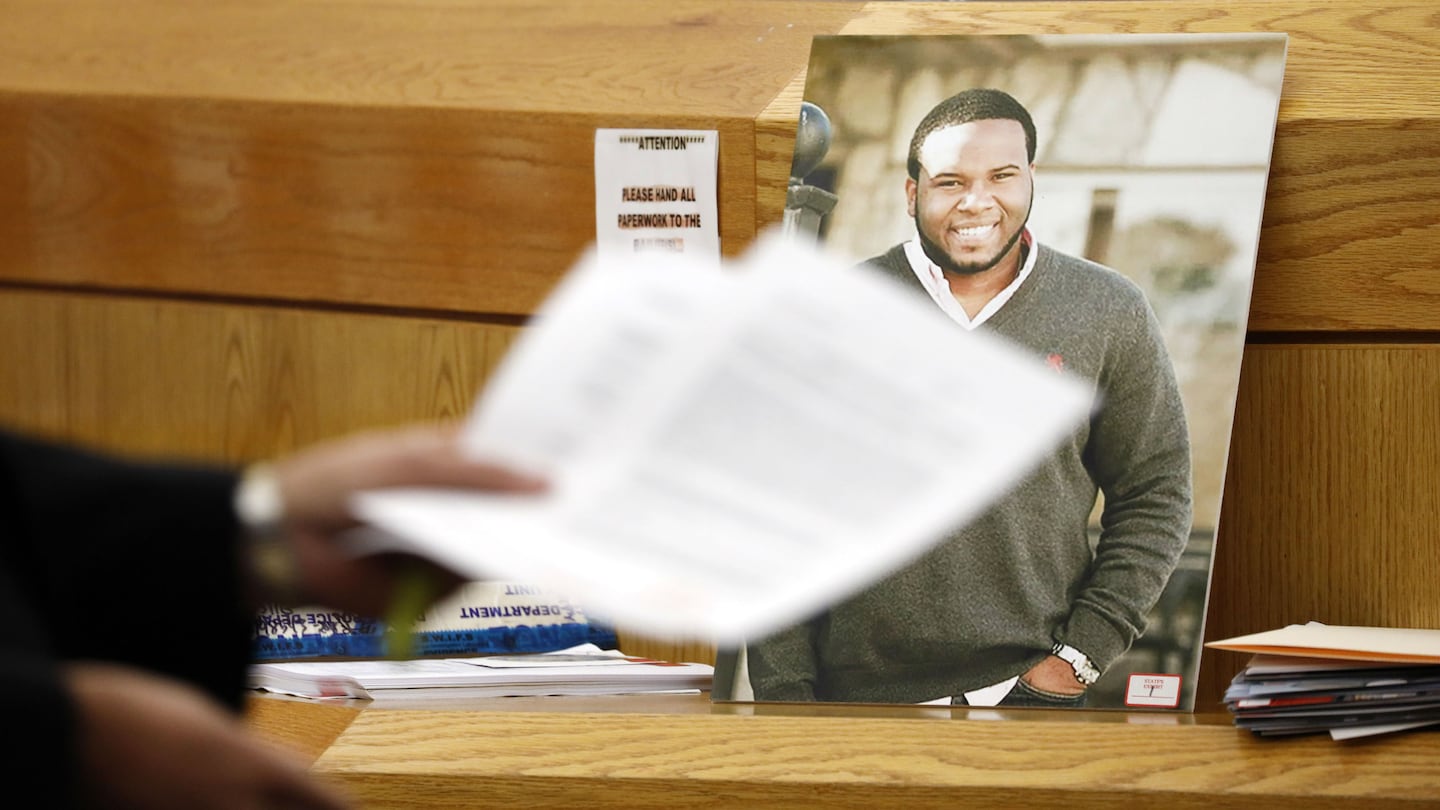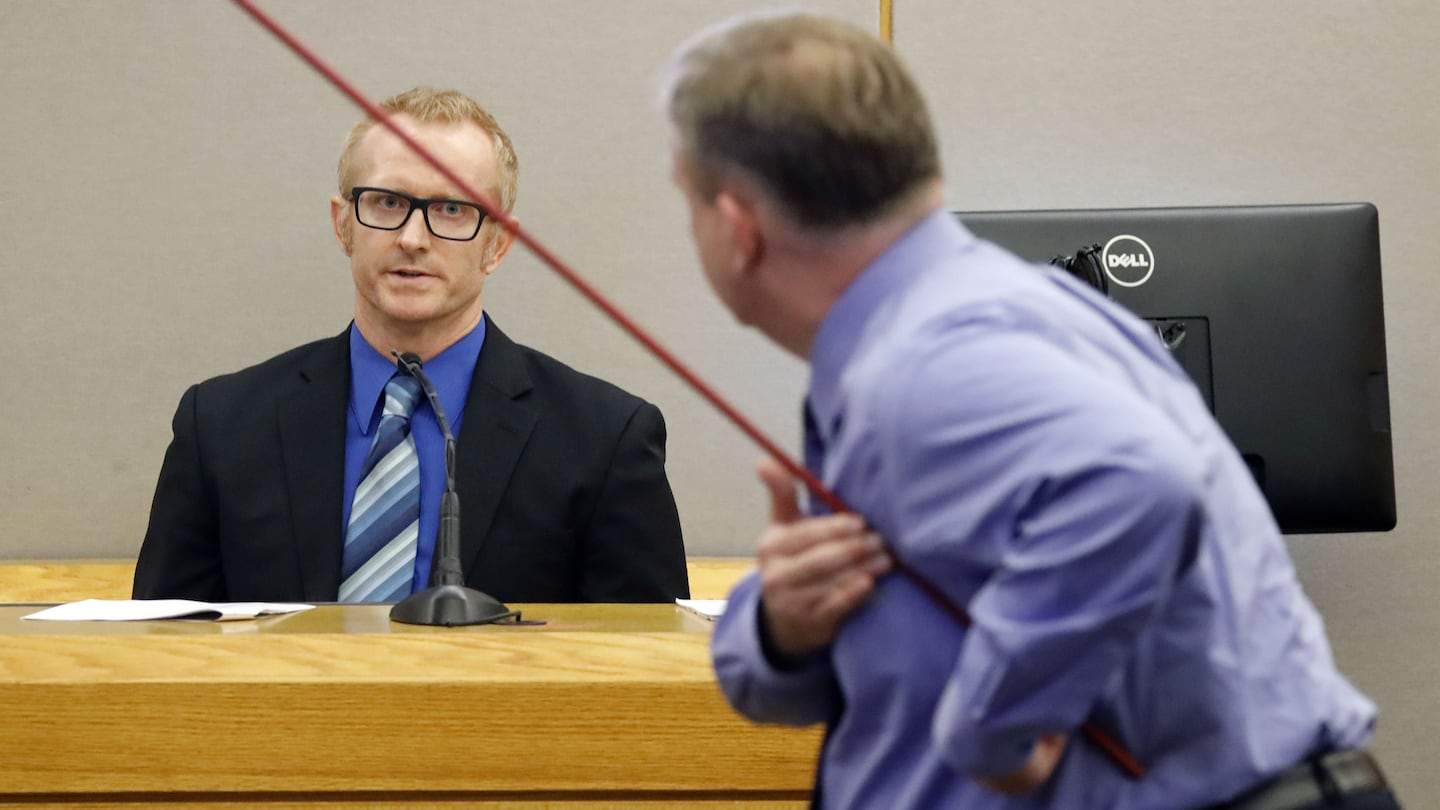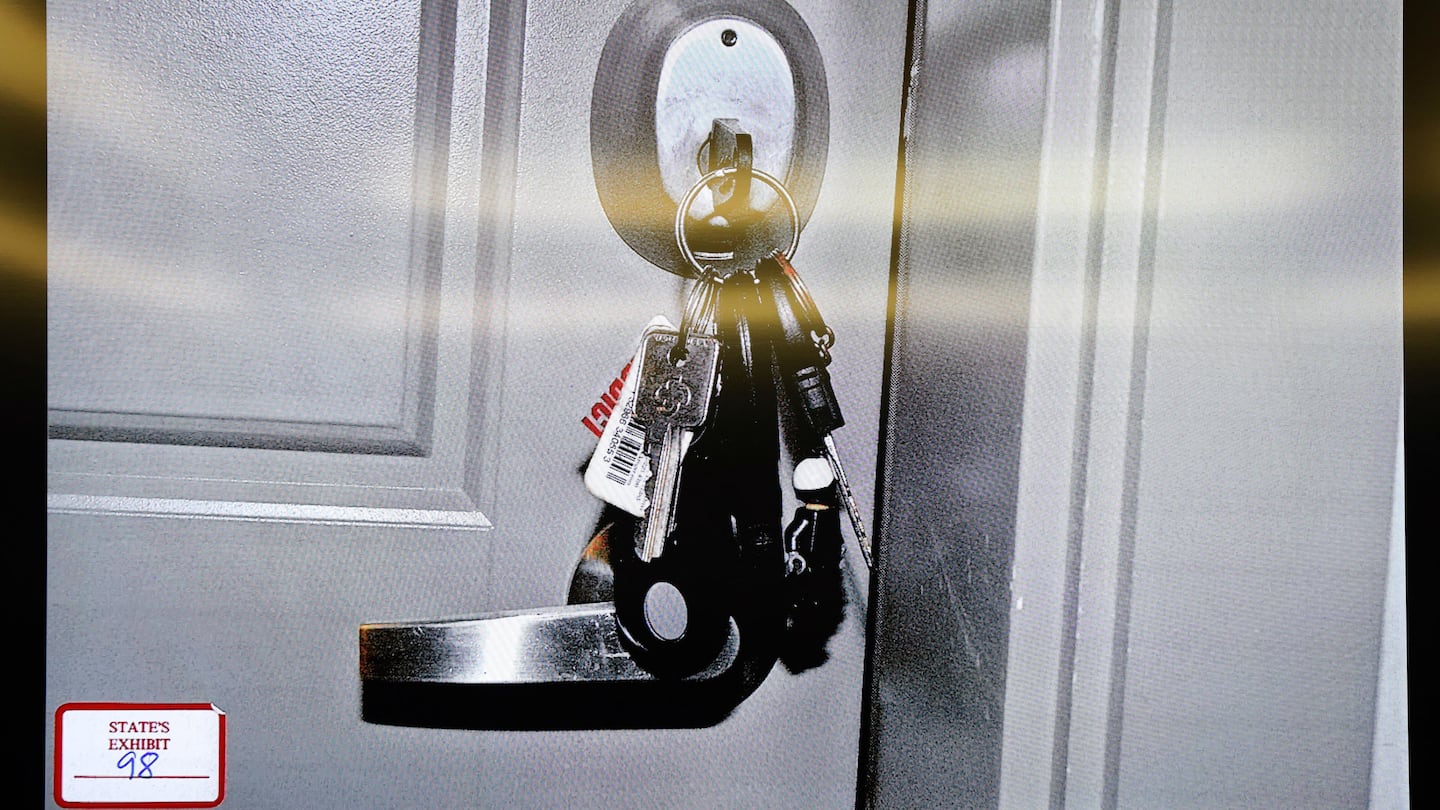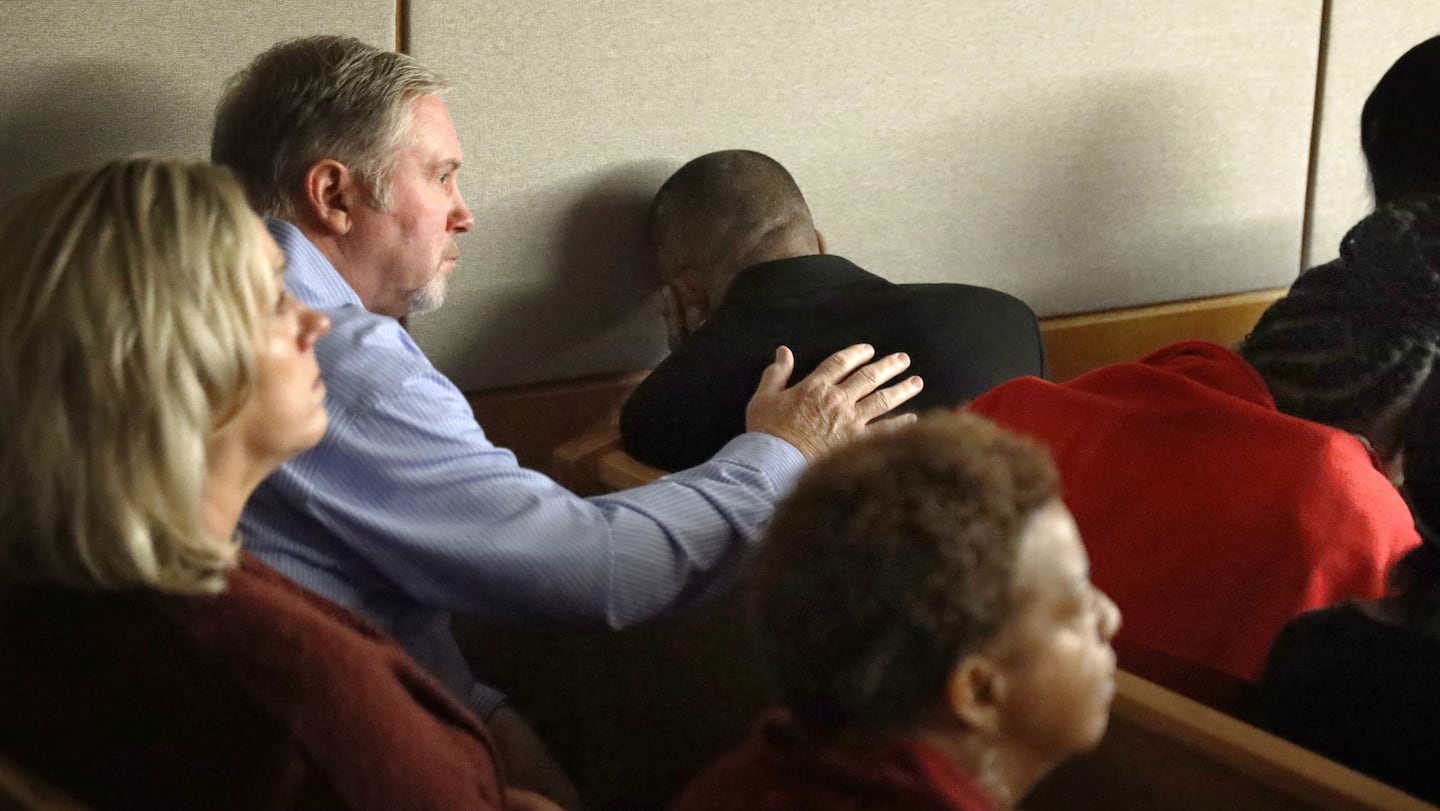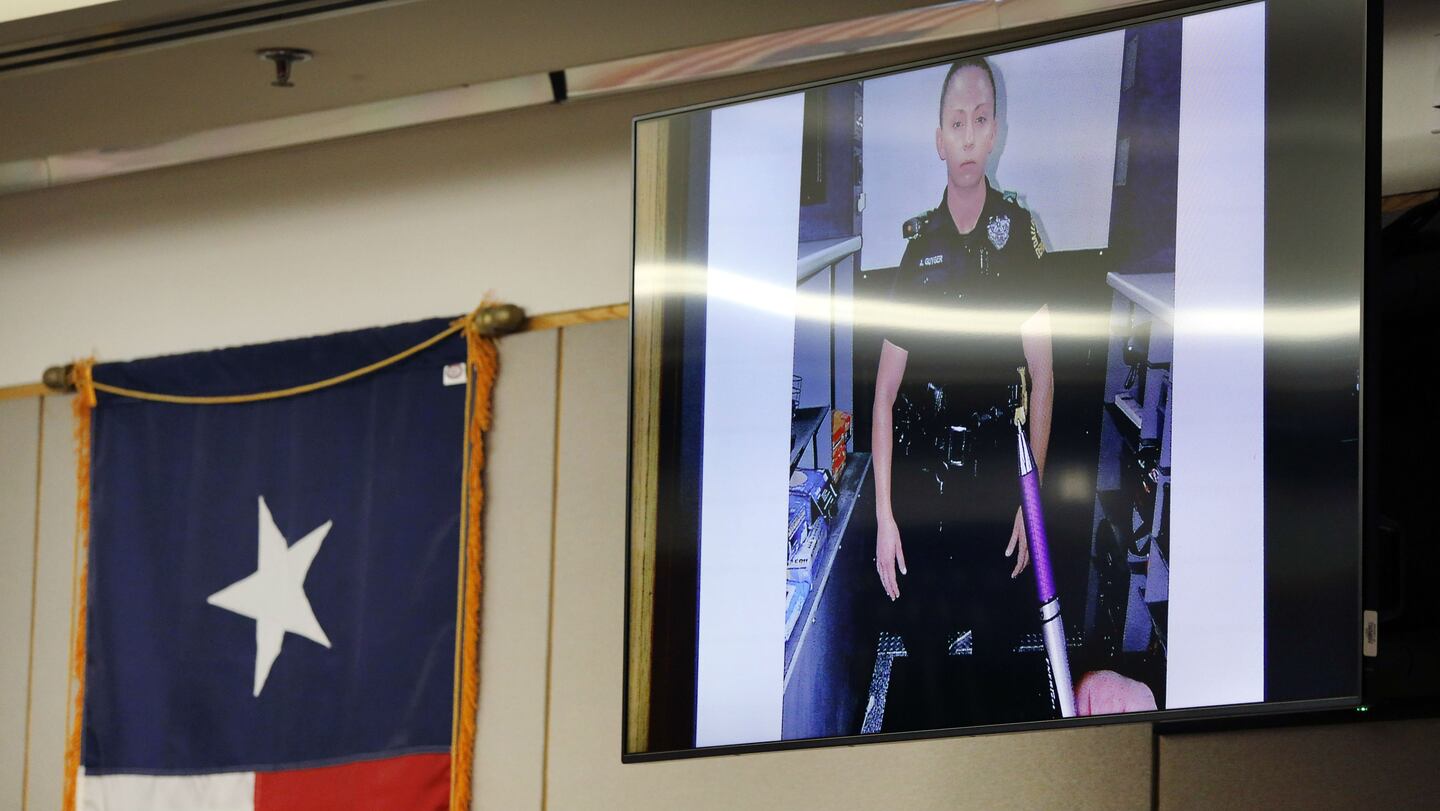DALLAS — The prosecution rested its case Thursday in the murder trial of ex-Dallas police Officer Amber Guyger, but not before jurors heard that her neighbor, Botham Jean, was either lying down or bent over when he was fatally shot in his own apartment.
Guyger, 31, is accused of killing Jean, 26, after going to his apartment by mistake Sept. 6, 2018, at the South Side Flats near downtown Dallas. She was off-duty but still in uniform after working a 14-hour shift as a patrol officer.
Jean's apartment was on the fourth floor of the apartment complex, directly above Guyger's apartment on the third floor.
Defense attorneys have argued that Guyger made an "awful and tragic, but innocent" mistake when she shot Jean, thinking he was an intruder in her home. They pointed to the confusing layout of the apartment complex and its garage, which they said has led dozens of residents to park on the wrong level or end up on a floor other than their own. The locking mechanism on Jean's door was also damaged, which left it ajar.
Guyger told investigators the door swung open when she put her key into the lock. Her attorneys argued the open door was another thing that led her to believe Jean was an intruder.
Jurors on Tuesday and Wednesday heard from Texas Ranger David Armstrong, who led the investigation into the shooting. Armstrong testified that his team interviewed 297 of the 349 residents of South Side Flats.
He said 46 of them told investigators they had walked to the wrong floor and put their key in someone else's door, according to The Dallas Morning News.
Armstrong also said he had his own trouble determine the floor he was on while investigating Jean's shooting. He said Wednesday that the building didn't offer many clues and that a black placard near the parking garage elevator was the only indication of the floor number, the News reported.
Listen to The Dallas Morning News' podcast on Armstrong's testimony below.
The newspaper reported that evidence photos showed the signs outside the elevator, as well as small signs inside the entryway of each floor indicating the level.
"There were no clear obvious signs showing what level you were on," Armstrong testified.
Additional signage has been added since Jean's slaying, the News reported.
Armstrong, who initially obtained a warrant for Guyger for manslaughter, testified outside the jury's presence that he did not believe Guyger committed a crime when she shot Jean. A grand jury upgraded the manslaughter indictment to one for murder in November.
>> Related story: Ex-Dallas cop Amber Guyger indicted on murder charge
Armstrong said he believed Guyger's actions to be reasonable.
"After finishing your investigation and looking at the totality of the circumstances and considering everything, do you believe today that you have probable cause to believe that Amber Guyger committed a crime?" defense attorney Robert Rogers asked, according to the News.
"Based on the totality of the circumstances, based on the complete investigation, no, sir," Armstrong said.
Judge Tammy Kemp ruled that the jury could not hear that portion of Armstrong's testimony because it was his opinion. The News reported that lead prosecutor Jason Hermus successfully argued that the jurors, and not Armstrong, are the real judges of the evidence in the case.
Hermus argued during the state's case that there were plenty of visual clues to make Guyger realize she was on the wrong floor and in the wrong apartment before she pulled the trigger. The apartment numbers were easily visible because they were lighted, testimony showed.
Another of the differences between Guyger's apartment and Jean's was a bright red doormat Jean had in front of his door. Guyger's apartment had no doormat.
In photos of the hallway leading to Jean's apartment, his doorway stands out because of the mat.
"Botham Jean wanted his apartment to be noticeable," Hermus told jurors.
A neighbor of Jean's also testified this week that he and Jean, known to family and friends as "Bo," had been smoking marijuana the night of the shooting. He indicated the smell would have been noticeable to others.
Armstrong also testified that he noticed the odor of marijuana when he arrived at the crime scene.
The entire trial is being streamed live on Court TV. Watch it here.
Dr. Chester Gwin, the Dallas County medical examiner who conducted the autopsy on Jean's body, testified that the bullet that killed him entered above his left nipple and traveled downward through his chest, striking a rib and tearing into his heart.
From there, the bullet went through his diaphragm, stomach and intestines before embedding in a muscle near his spine.
According to the News, Gwin said the injury to Jean's heart was the cause of death.
Gwin, who said he could not pinpoint exactly where either Guyger or Jean was at the time of the shooting, testified that Jean was could have been crouching, cowering, ducking or in the process of standing from the couch when he was killed.
He also could have been lying on his back, Gwin said.
Hermus used a red dowel rod to show jurors, with his own body as a prop, the path of the bullet that killed Jean.
"For the purposes of the path through the body, is it fair to say that the bullet is going to be coming from the other end of this dowel rod, wherever the body may have been positioned?" Hermus asked Gwin.
"Yes," Gwin answered.
The prosecution used computerized graphics to show the theoretical locations where Jean may have been when he was shot. Hermus told jurors during opening statements that Jean was on his couch, eating ice cream, when Guyger entered his apartment.
"As Bo was trying to get up off the couch to find out what this intruder was doing coming into his home, she is leveling off her gun, having acquired her target," Hermus said. "And she shoots at him twice."
The defense, which began its case Friday morning, has argued that Jean was advancing toward Guyger in the dark room when she fired her weapon, fearing he might also be armed.
Watch body camera footage of police officers' response to Botham Jean's apartment below, courtesy of Court TV. Warning: The video contains graphic content, though images of Jean are covered.
GRAPHIC CONTENT: Body Cam Video From TX v. Amber Guyger Shooting SceneGRAPHIC CONTENT: State plays body camera footage from Botham Jean's apartment after being shot by Guyger. court.tv/live
Posted by COURT TV on Tuesday, September 24, 2019
Hermus told jurors that Guyger was preoccupied with thoughts of a sexual rendezvous with her partner on the force, Officer Martin Rivera, with whom she also had a romantic relationship. Text messages and phone records show Guyger was talking and texting Rivera about a possible hook-up in the minutes before Jean was shot.
The defense stated during opening statements that the romantic relationship had ended months before Jean's death and Guyger and Rivera were simply being flirtatious as they texted throughout Guyger's shift that day.
Guyger was on the phone with Rivera as she parked -- on the wrong level -- in the parking garage attached to the apartment complex.
Testimony during the state's case showed a gap of three minutes and 40 seconds between the end of Guyger's conversation with Rivera and her 911 call stating she'd shot someone.
Jurors also heard this week from the Dallas police officers who initially responded to Guyger's 911 call. They saw body camera footage that showed those officers doing CPR in an effort to save Jean's life.
According to the News, prosecutors used the officers' testimony to show the contrast between their response to the man dying on his living room floor and Guyger's response.
"What you guys did was exceptionally heroic," Hermus told Officer Tu Nguyen.
Nguyen's body camera captured the actions of the officers who found Jean lying on his back. In the footage, Guyger is seen meeting the officers outside the apartment and telling them, as she had told the 911 dispatcher a total of 19 times, that she had mistakenly gone into the wrong apartment.
Nguyen is seen putting a pillow under Jean's feet to move blood back to his torn heart, the News reported. Hermus asked the officer about Jean's "condition of life" at that point in the efforts.
"It was faint," Nguyen responded, according to the newspaper.
Jean's parents, Bertram and Allison Jean, were visibly distressed when the footage of their son's last moments was shown during Armstrong's testimony outside of the presence of the jury. Media photos show Bertram Jean leaning his head into the wall next to him, with Allison Jean leaning forward and appearing to shield her eyes.
Bertram Jean also covered his ears, so he could not hear police officers' frantic efforts to revive his son. A family friend patted his back in comfort.
The parents left the room after the video, which was shown on three large screens, ended, the News reported. The newspaper said Allison Jean was weeping as she walked out and, for the next several minutes, a "low wail" could be heard every time the courtroom door was opened.
Kemp, herself visibly upset, apologized when she realized Jean's parents had been in the courtroom during the playing of the video. At another point in the trial, the video had been played for jurors but kept off the screens visible to the rest of the courtroom.
"Oh, I'm so sorry," Kemp said, a hand on her forehead, according to the News. "I didn't even give any thought to the victim's family, the alleged victim's family being here."
Another major focus of testimony this week was the placement of Jean's sandals, which defense attorneys argue showed that Jean was standing closer to Guyger when she fired the shots than where his body ended up.
Nguyen testified, however, that he'd moved the sandals away from Jean's body -- and closer to the door of the apartment -- as he and other officers tried to save the man's life.
Texas Ranger Michael Adcock testified Thursday that Jean's body was lying 13 to 15 feet from the door, the News said.
Adcock also testified that Guyger had no blood on her uniform and blue latex gloves in her pocket, which officers carry in case they have to perform first aid on someone, appeared unused and showed no signs of blood.
Guyger claimed to have performed CPR on Jean, but the lack of blood showed she had not, prosecutors said. The 911 call appeared to back up that evidence.
The prosecution showed jurors photos of Guyger texting on her phone in the hallway as other officers were inside the apartment, performing CPR on the dying Jean. The state told jurors during opening statements that Guyger was texting Rivera after the shooting.
"I need you … hurry," one text read, according to the News.
"I (expletive) up," the second stated.
Jurors also heard the Guyger's 911 call.
"I'm an off-duty officer," a breathless Guyger said in the recording. "I thought I was in my apartment and I shot a guy thinking he was, thinking it was my apartment."
"You shot someone?" the dispatcher asked.
"Yes, I thought it was my apartment," Guyger responded. "I'm (expletive)."
As Jean lay dying, Guyger appeared more concerned about the repercussions she would face.
"Get up man," Guyger could be heard telling Jean in the recording. "Hey, come on, man."
The dispatcher reassured Guyger that help was on the way. "I know, but I'm …," she said, sounding near tears. "I'm gonna lose my job."
Listen to Amber Guyger's 911 call following Botham Jean's shooting below, courtesy of WFAA in Dallas. Warning: The recording contains graphic language.
Prosecutors used the body camera footage, which showed the officers using their training as they approached the scene, to hammer into jurors' minds their argument that Guyger violated her training when she immediately fired upon Jean.
Guyger's behavior after the gunfire, particularly her failure to render first aid to Jean, has been a major point of the prosecution's case.
"She should have made it her point of existence to take care of that man," Hermus told the jury in opening statements.
The trial resumed Friday morning with the defense's case, the highlight being testimony from Guyger.
Cox Media Group

